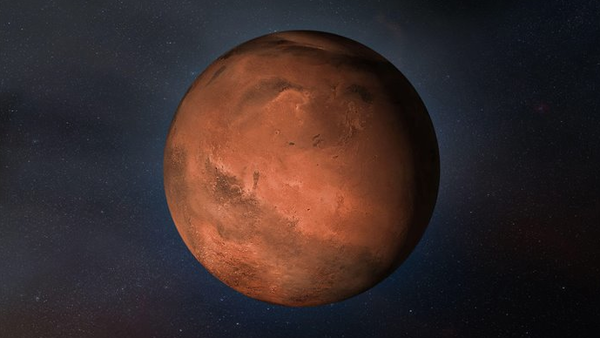
Funding awarded to develop Martian chamber
The Planetary Sciences team was awarded £320,000 by the UK Space Agency to create a unique chamber simulating Mars’ environment. Aberdeen is one of just 7 UK universities to be awarded this funding.
This programme is designed to provide students from any academic background an informed understanding of planetary atmospheres and landforms, space environment, remote sensing, data analysis, astrobiology and space systems engineering and instrumentation, giving you a springboard for a career in the rapidly expanding space sector.
This course has both January and September start dates.
This programme is also available to study online.
We live in a time of unprecedented investment and collaboration in space exploration led by the ‘big six’ space agencies – NASA, ESA, Roscosmos, CNSA, ISRO and JAXA – and an ever-growing list of national space agencies and private companies such as SpaceX, Virgin Galactic and Blue Origin, who are keen to compete in the rapidly expanding spaceflight sector.
The ambitious plans for the following decades include sending humans back to the moon, establishing a colony on Marrs, searching for life near Saturn, sending missions to probe the metalcore of a dead planet, and exploring the hidden ocean on Jupiter's moon Europa.
These plans pose significant scientific and technological challenges that can only be overcome through an interdisciplinary approach. That is why this programme draws on the diverse expertise of the planetary sciences team at the University of Aberdeen to provide you with a detailed understanding of the pioneering research and technological developments that will guide the future development of space exploration.
You will study the Earth and other objects of the solar system such as the Moon, Mars and exoplanets, to understand the critical steps of formation of these objects, including the physics of atmospheres, magnetic fields, geomorphology of the surface, isotopic differentiation and the formation of habitable environments. As you delve deeper into these topics you will also develop the key technical research skills needed for deep space exploration such as remote sensing, spectroscopy, and instrument design.
Our aim is to educate and train a new generation of geologists, physicists, chemists, biologists and engineers of all disciplines. The interdisciplinary training included in this programme will provide you with the skills to tackle other problems outside of space exploration, such as instrument design, geology, microbiology and environmental sciences, planetary sciences and data analysis in remote sensing.
We will endeavour to make all course options available. However, these may be subject to change - see our Student Terms and Conditions page.
Self-funded international students enrolling on postgraduate taught (PGT) programmes will receive one of our Aberdeen Global Scholarships, ranging from £3,000 to £8,000, depending on your domicile country. Learn more about the Aberdeen Global Scholarships here.
To see our full range of scholarships, visit our Funding Database.
Space exploration requires technological expertise and innovation, but also an understanding of the commercial, political and legal aspects of space agencies and the wider space industry. That is why the MSc Planetary Sciences is open to students from any academic background.
The information below is provided as a guide only and does not guarantee entry to the University of Aberdeen.
2:1 (upper second class) UK Honours degree, or an Honours degree from a non-UK institution which is judged by the University to be of equivalent worth, in any discipline.
Please enter your country to view country-specific entry requirements.
To study for a Postgraduate Taught degree at the University of Aberdeen it is essential that you can speak, understand, read, and write English fluently. The minimum requirements for this degree are as follows:
IELTS Academic:
OVERALL - 6.5 with: Listening - 5.5; Reading - 5.5; Speaking - 5.5; Writing - 6.0
TOEFL iBT:
OVERALL - 90 with: Listening - 17; Reading - 18; Speaking - 20; Writing - 21
PTE Academic:
OVERALL - 62 with: Listening - 59; Reading - 59; Speaking - 59; Writing - 59
Cambridge English B2 First, C1 Advanced, C2 Proficiency:
OVERALL - 176 with: Listening - 162; Reading - 162; Speaking - 162; Writing - 169
Read more about specific English Language requirements here.
You will be required to supply the following documentation with your application as proof you meet the entry requirements of this degree programme. If you have not yet completed your current programme of study, then you can still apply and you can provide your Degree Certificate at a later date.
Eligible self-funded postgraduate taught (PGT) students will receive the Aberdeen Global Scholarship. Explore our Global Scholarships, including eligibility details, on our dedicated page.
Aberdeen Global ScholarshipsThe UK space industry is booming. Findings from the UK Space Agency reveal that as of 2022, year-on-year growth of the UK space sector outpaces the wider economy by 5%. This follows the positive year-on-year growth in sector employment seen annually since the 2011/12 year (‘Size and Health of the UK Space Industry 2022’)
The growth in the space industry has, however, placed stress on skills supply, i.e. the growth in the number of people with the required skills has not kept pace with growth in demand.
Employers need graduates with technical skills, supported by qualifications at the post-graduate level, which is what this programme is designed to provide. This degree will prepare you for a career in the space industry, as well as careers outside of planetary science research.
You’ll learn from teaching staff who are involved in the Planetary Protection Boards of NASA and ESA, and the Mars Sample Return Scientific Advisory Team.
We are one of seven universities in the UK that have been funded to work towards international space science and exploration projects. Our team is currently collaborating with Oxford Nanopore Technologies on pioneering Space DNA Sequencing and is also deeply engaged in planetary sciences and astrobiology.
You will be taught by a range of experts including professors, lecturers, teaching fellows and postgraduate tutors. However, these may be subject to change - see our Student Terms and Conditions page.